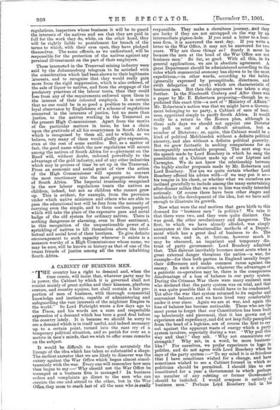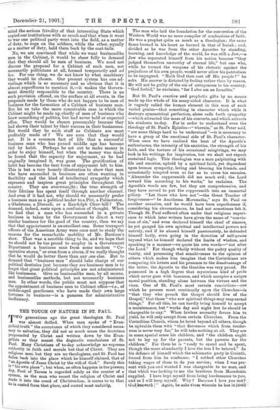A CABINET OF BUSINESS li[ErT.
iErE country has a right to demand and, when the time comes, will insist that, whatever party may be in power, the Cabinet by which it is governed shall not consist mainly of great nobles and their kinsmen, platform orators, and country squires, but shall contain a fair pro- portion of men of business, with thorough commercial knowledge and instincts, capable of administering and safeguarding the vast interests of the mightiest Empire in the world." So Lord Pirbright wrote a few days ago to the Times, and his words are a • sane and respectable expression of a demand which has been a good deal before the country lately. -It is because we should -be sorry to see a demand which is in itself useful, and indeed necessary up to a certain point, turned into the cant cry of a temporary political situation, and so perish for ever as a motive in men's minds, that we wish to offer some remarks on the subject.
It -would be difficult to trace quite accurately the lineage of the idea which has taken so substantial a shape. The earliest ancestor that we are likely to discover was tlae outcry against the War Office which began almost simul- taneously with the war. Every one will remember how men then began to say Why should not the War Office be managed as a business firm is managed? In business orders and complaints go direct to the men who can execute the one and attend to the other, but in the War Office they seem to reach last of all the man who jef malty . . responsible. They make a circuitous journey, ,find they are lucky if they are not entrapped on the way by aca intermediate pigeon-hole.- If you send a letter to a busi- ness firm, it is answered the next. day.- If you write a, letter to the War Office, it may. not be answered . for two years. Why are these things so? Surely it must be because the Dien at the head of the War Office • are not business men'' .86 far, so good. With all this, in general' applications, we are iii absolute 'agreement. great Department ehoiild be administered according to the rules' which commercial economy has Shawn to be the Most expeditious,—in other words, according to the habits (generally. 'expressedby promptitude, ' directness, and swift'delegation of Work) Which are characteristic of business Men. But then the argainent Was taken 'a 'Step further. In the Nineteen:1h. Century tsnd After there was a paper by Mr. E. Robertson proposing—thou-gh. he re._ pudiated this exact title—a sort of "Ministry of Affair." Mr: Robertson's notion was that we might have a Govern.: ment belonging to no party, a Cabinet of men of busi- ness, appointed simply to pacify South Africa. It would. really be a return to the Roman plan, although in these safe days we should not appoint one Dictator' to pull us out of a difficult situation, but a number of Dictators; Or, again, this Cabinet wouldhe a kind of political Melchisedek without a definite political ancestry, and also without a definite political posterity.. But we grow fantastic in seeking comparisons for an incomparably unworkable proposal. The next step was the speech made by Lord Rosebery in which he sang the possibilities of a Cabinet made up of our Liptone and Carnegies. We do not know the relationship between the highly similar proposals made by Mr. Robertson and Lord Rosebery. Nor are we quite certain whether Lord Rosebery offered his advice with—if we may put it so— his tongue in his cheek, or whether what we ourselves are inclined gratefully to include among the many entertaining after-dinner sallies that we owe to him was really intended seriously. Of course there have been other stages and incidents in the 'development of the idea, but we have said enough to illustrate its growth.
Now what were the real motives that gave birth to this demand for "business men" in politics? We take it that there were two, and they, were quite distinct. One was good, the other revolutionary and dangerous. The first, to which we have already alluded, was simply annoyance at the unbusinesslike methods of a Depart- ment which has a great deal of business to do. The second was, and is, at bottom, however much 'it may be obscured, an impatient and temporary dis- trust of party government. Lord Rosebery admitted that. This distrust inevitably becomes most acute when's, great external danger threatens the nation—a war, for example—for then both parties in- England usually forget their differences and make common cause against the enemy. In such a situation, whatever the advantages of a patriotic co-operation may be, there is the conspicuous. disadvantage of a loss of balance in our party system. During the Crimean War there were . many eminent men who declared that the party system was on trial, and that it was quite possible that it would have to be condemned. Yet after the war that system returned:to its regular and convenient balance, and we have lived very comfortably under it ever since. Again we are at war, and again the loss of balance has become noticeable. Those who are the most prone to forget that our Constitution has been built up laboriously, and. piecemeal,. that it has grown out of experience and expediency; and did not leap:fully panoplied from the head of a logician, are of course the first to cry out against the apparent Waste of energy which a party system involves, especially during a war. Why pull this way and that ? ' they ask. Why not concentrate our, strength? Why not, in a, word, be more business.' like? ' • For ourselves, we prefer • experience to logic in polities, and do not agree with Lord Rosebery when he says of the party system :—" To my mind it is so frivolous that I have sometimes wished for a change, and have sometimes wished to see a Cabinet formed in which no politician should -be permitted. I should- like to see constituted for a year a Government in which perhaps no member of any existing or former Government should...be included. I would compose it entirely of business, men." Perhaps LOA Rosebery had. in 1ii3 mind the serious frivolity of that interesting State which copied our institutions with so much zeal that when it went to war one political party went into the field, as a matter of duty, to urge on the soldiers, while the other, equally as a matter of duty, held them back by the coat-tails.
'No; we are convinced that while we want businesslike men in the Cabinet, it would be sheer folly to demand that they 'should all be men of business. We need not discuss the proposal for a Cabinet of such men, not necessarily politicians at all, formed temporarily and ad hoc. For one thing, we do not know by what machinery they would be chosen. Our present system 'has one ad- vantage which is so necessary and so obvious that it is almost superfluous to mention it,—it makes the Govern- Meat directly responsible to the country. There is no such provision offered, on the surface at all events, in the proposals made by those who do not happen to be men of business for the formation of a Cabinet of business men. But let us take the more conceivable case in which the Cabinet might be made up. chiefly of men of business who bieW something of politics, but had never held or expected office. They would be chosen presumably because they had shown their talent by their success in their businesses. But would they, be such stuff as Cabinets are most profitably made of ? We are sure '.that they would not. It is a common fact of life 'that a successful - business man who has passed middle age has become tied by habit. Perhaps he set out to make money in order to enjoy himself, but when• the money was made he found that the capacity for enjoyment, as he had originally imagined it, was gone. The gratification of habit has become the best form of enjoyment left to him. This is but a very homely illustration to show that men who have succeeded in business are often wanting in flexibility . and the kind of intellectual sympathy which expresses and inspires great principles throughout the country. They are overwrought; the true strength of their lifetime has spent itself through another channel. And even if it had not, why should we necessarily, prefer a business man as a political leader to a Pitt, a Palmerston, a Gladstone. a Disraeli, or a Randolph Chur.IM ? The demand, indeed, rests upon a confusion of thought. When we find that a man who has succeeded in a private business is taken by the Government to di-met a very similar business for the good of the country, then we say that that appointment is an excellent one. Some transport officers of the American Army were once sent to study the reasons for the remarkable mobility of Mr. Banaum's show. That was a sensible thing to do, and we hope that we should not be too proud to employ in a Government Dapartment - a business man from some modern "Co- operative stores," or even from a circus, if we really thought that he would do better there than any one else. But to demand that "business men" should take charge of our political destinies just because they are business Men is to forget that great political principles are not administered like businesses. Give us businesslike men, by all means, and businesslike methods, but not necessarily, business men. In other words, the public must not suppose that the appointment of business men to Cabinet office—i.e., of middle-aged gentlemen who have made their own large fortunes in business—is a panacea for administrative inefficiency,











































 Previous page
Previous page